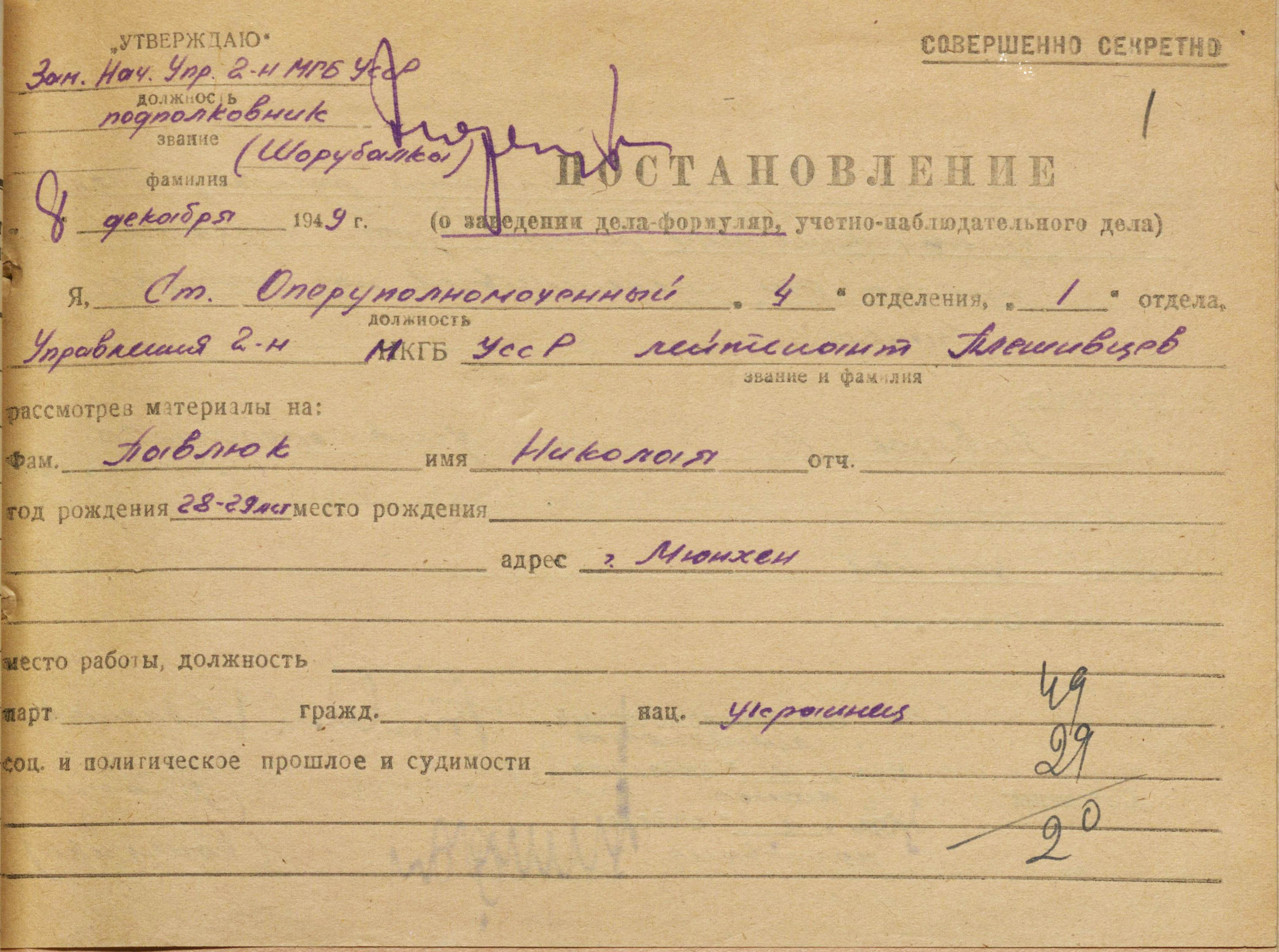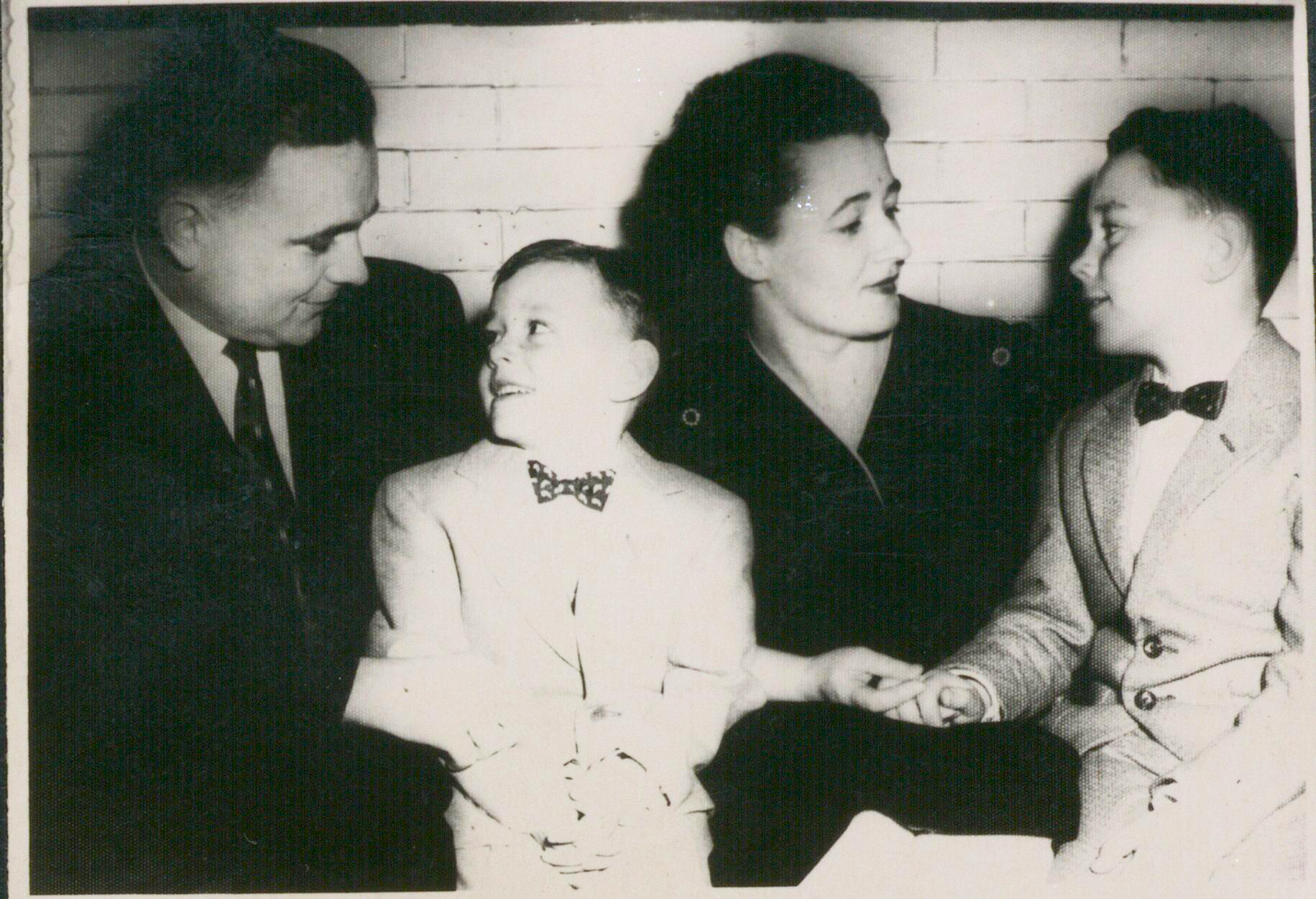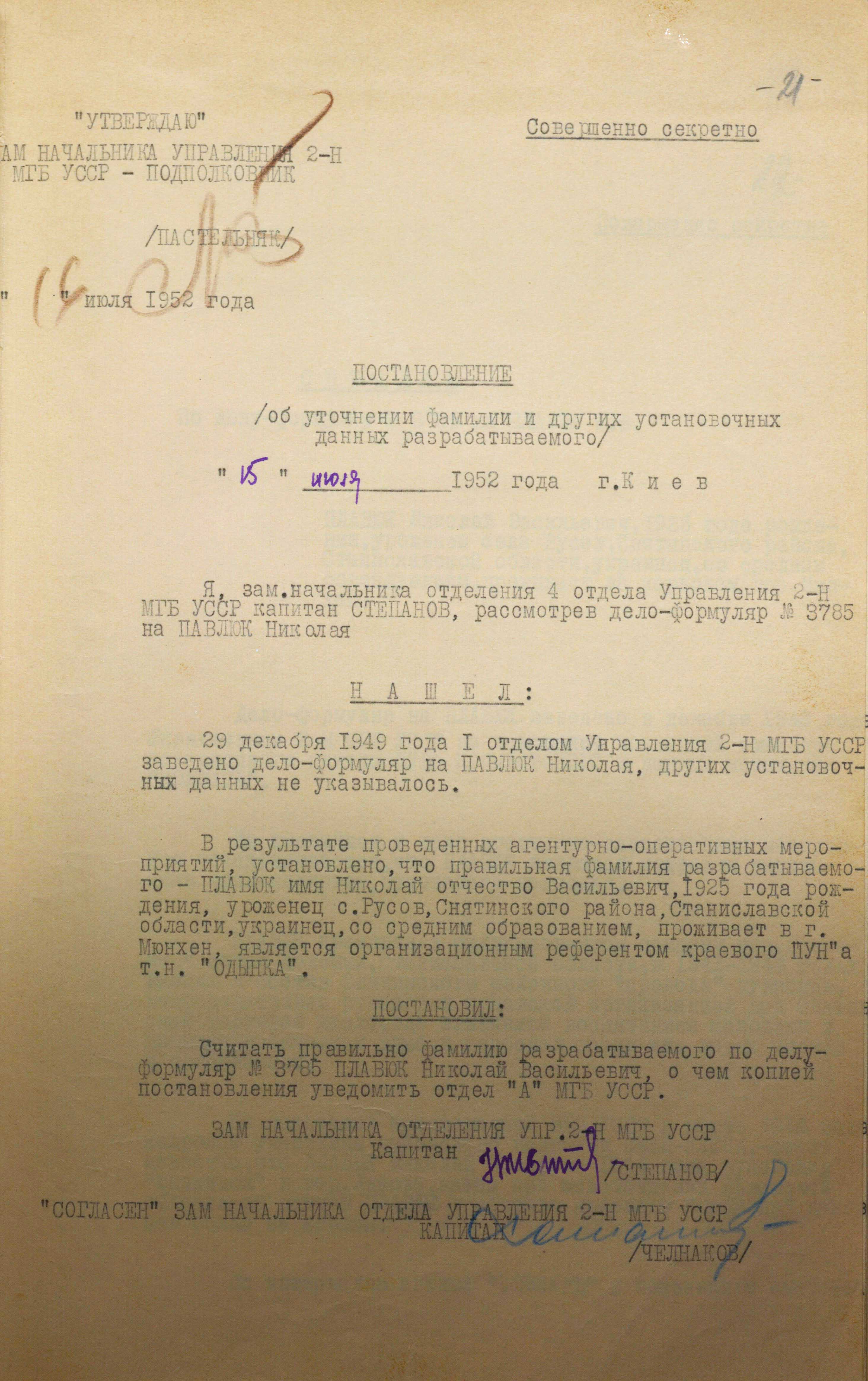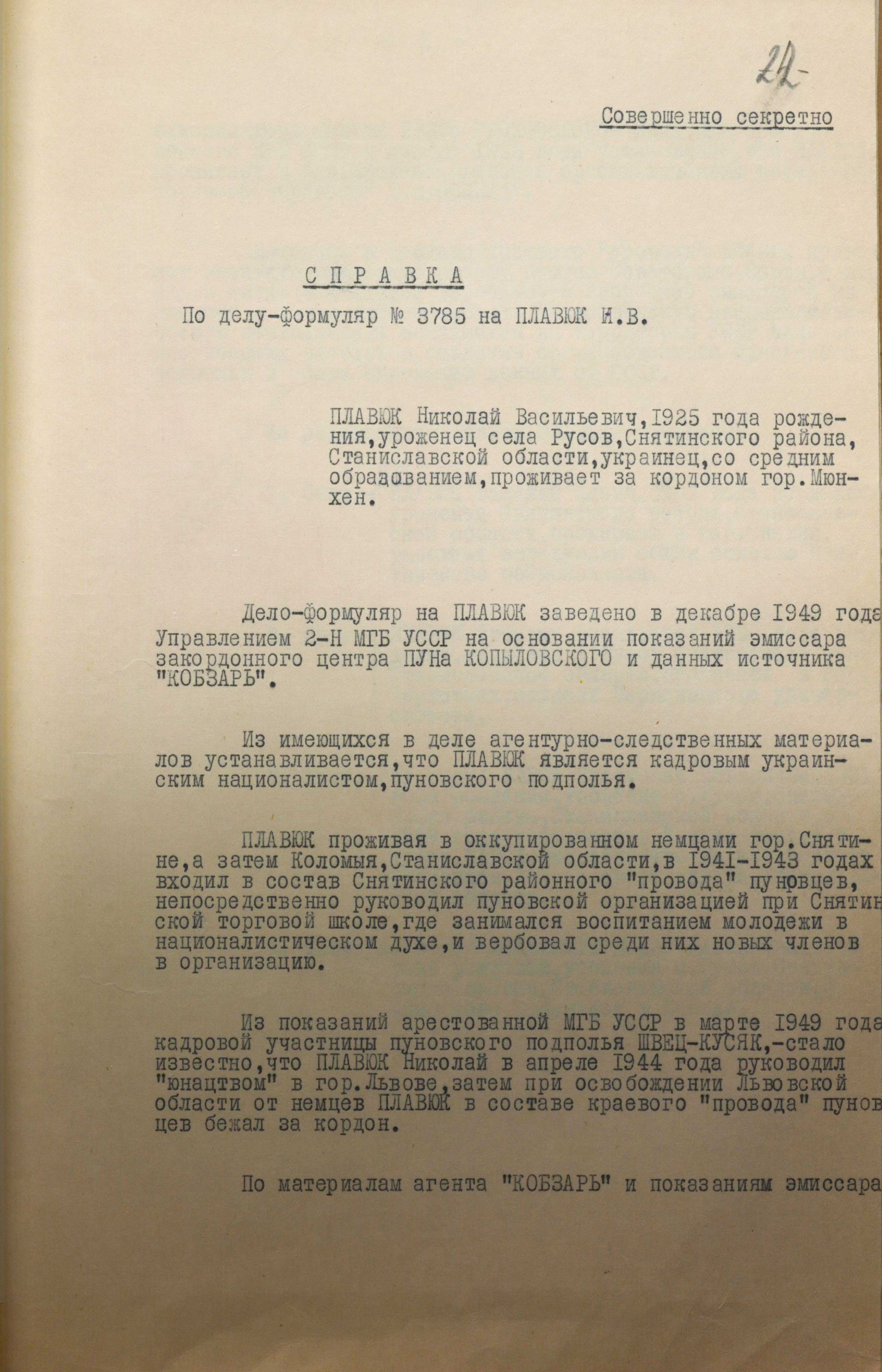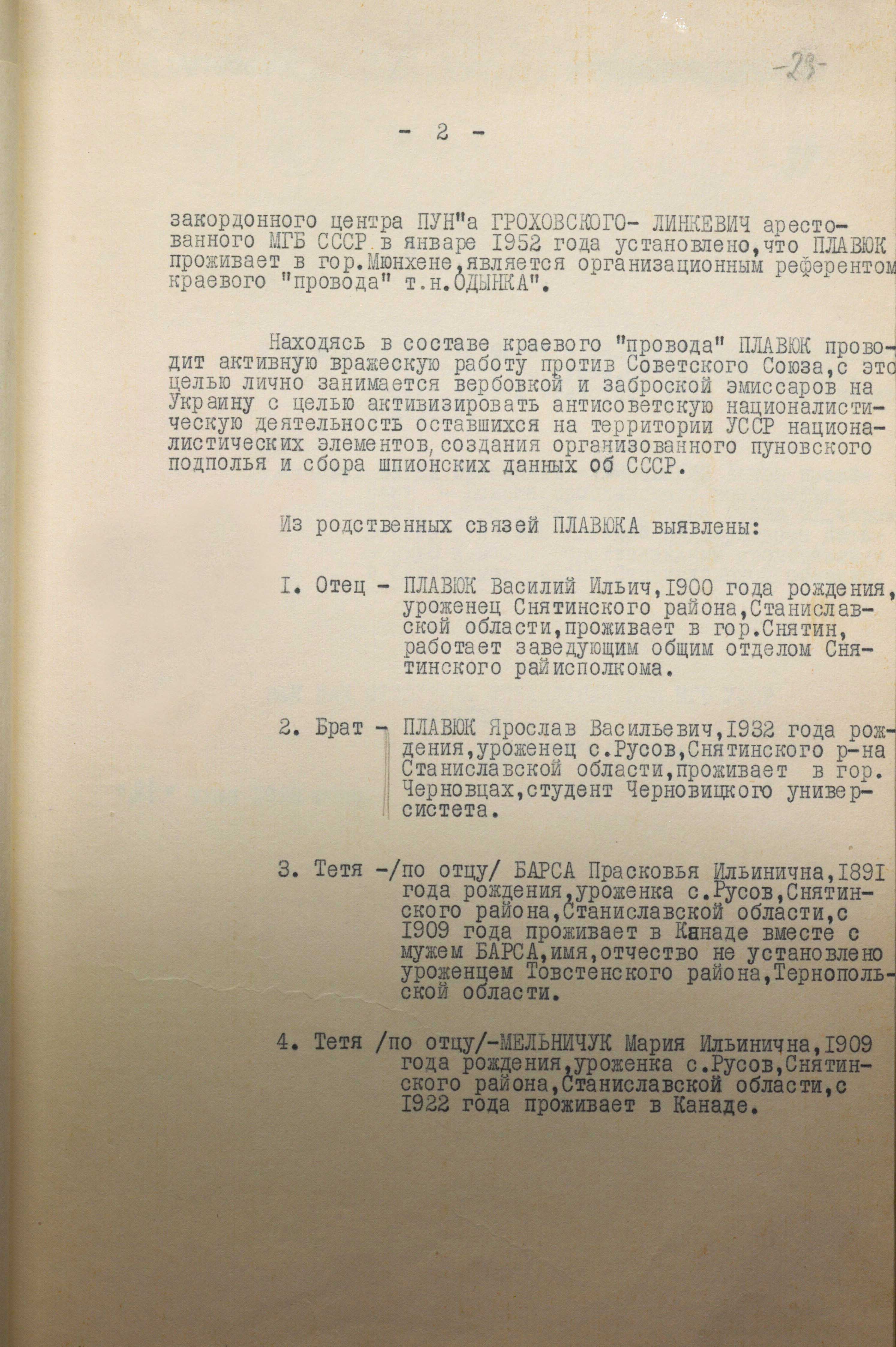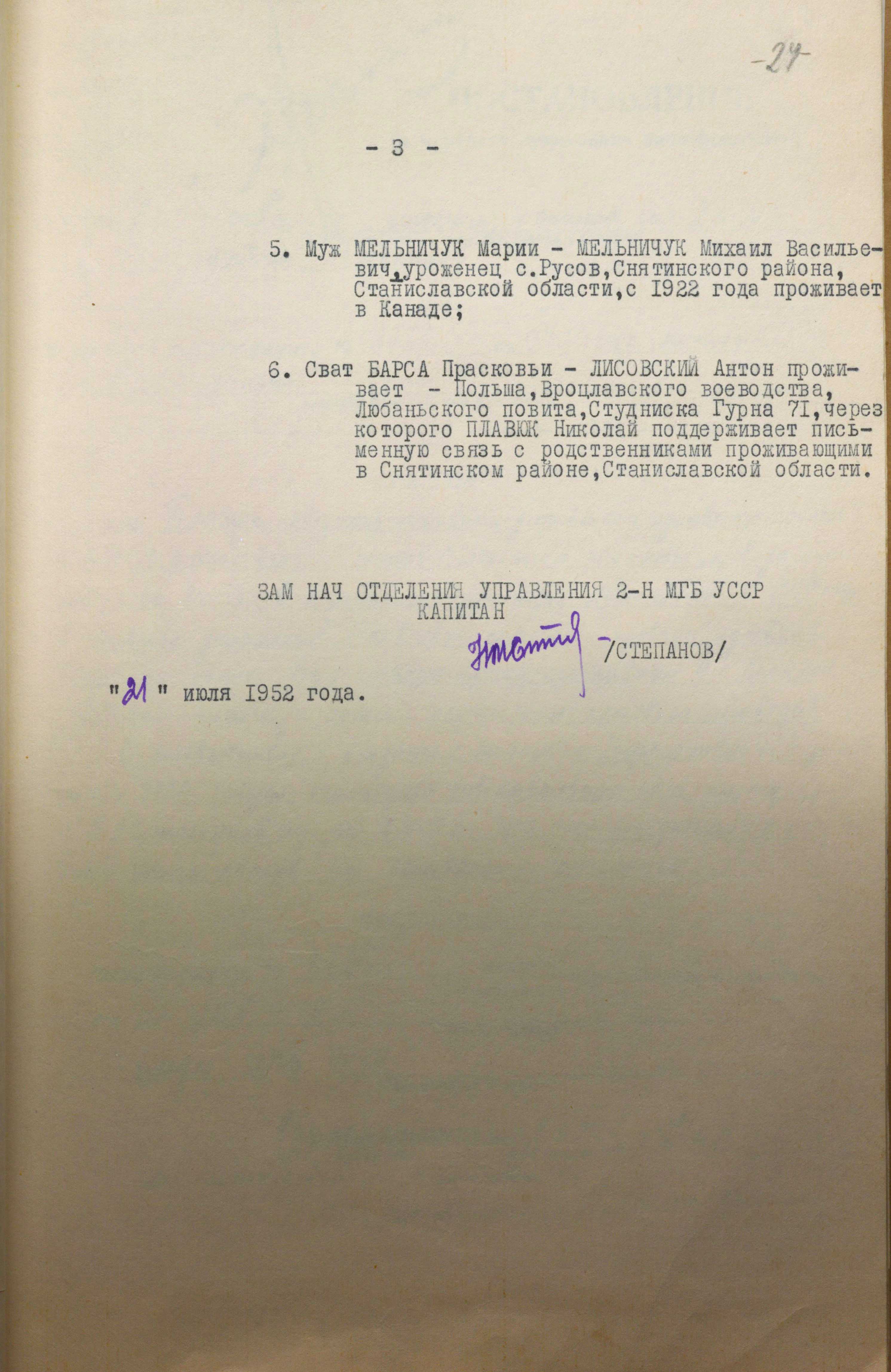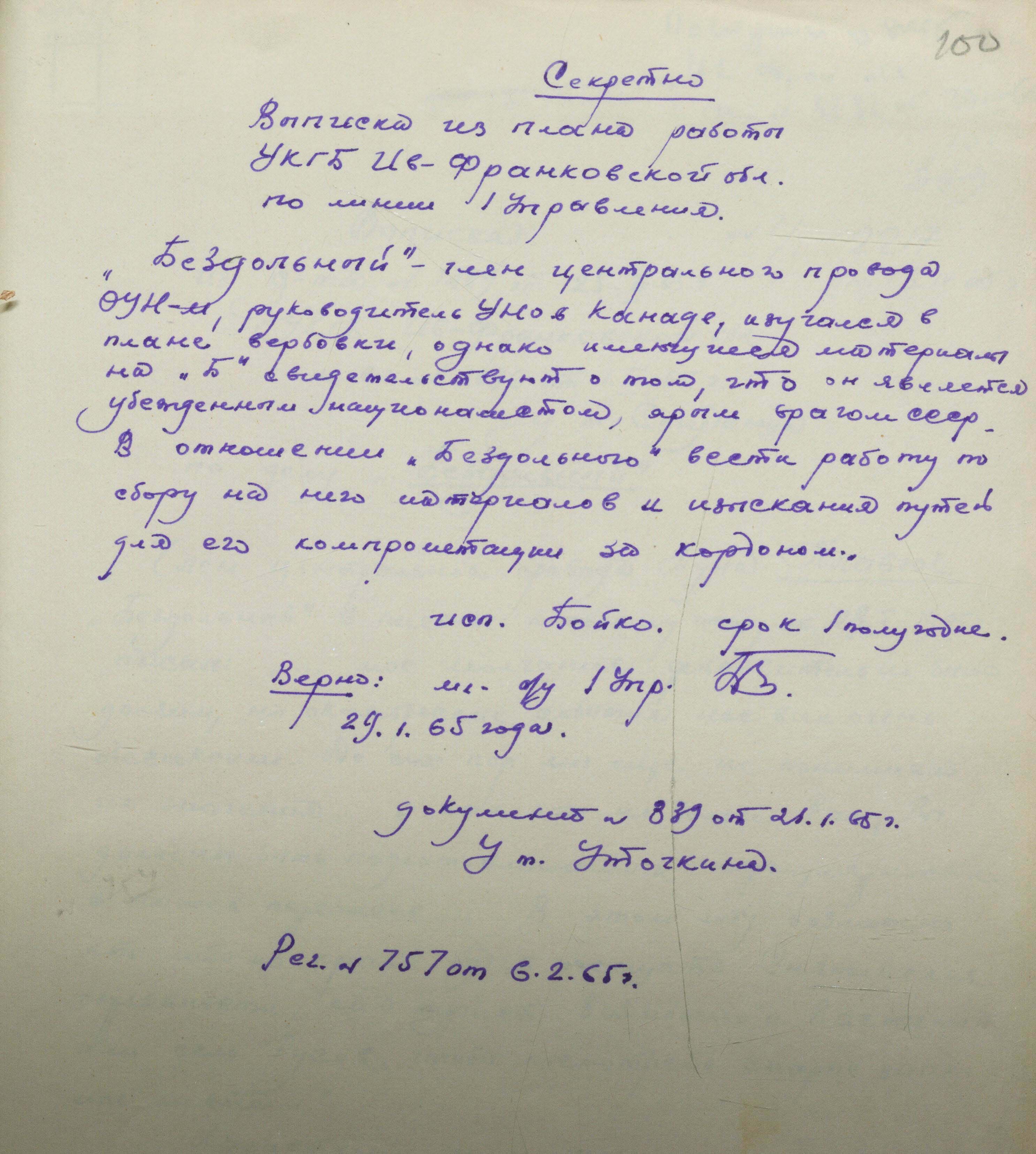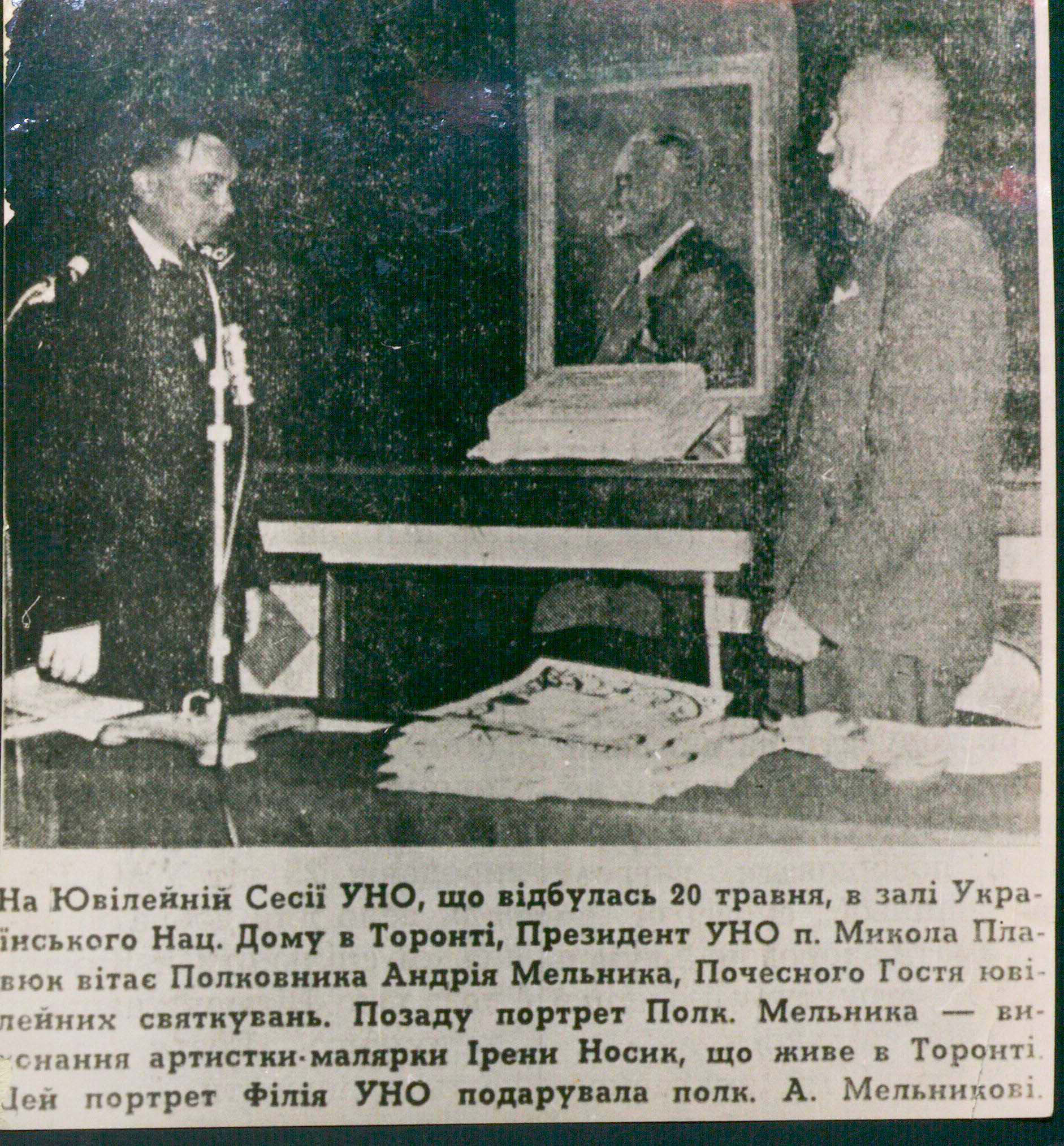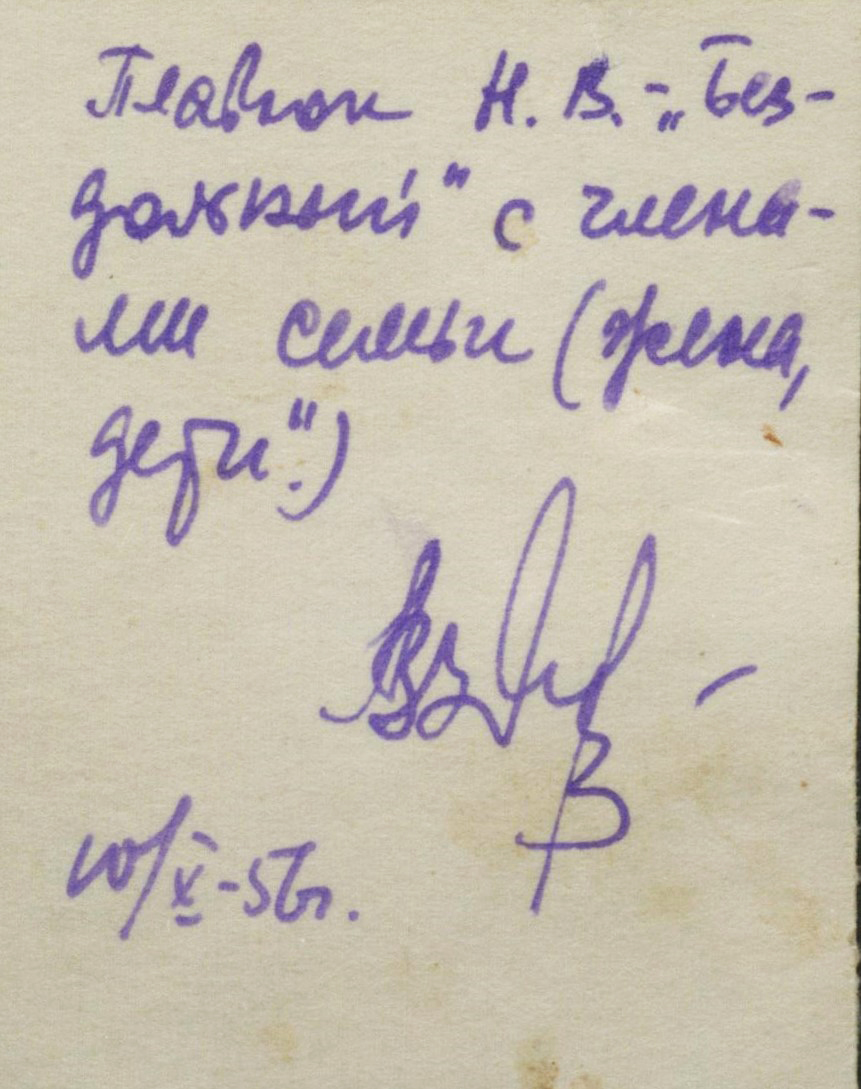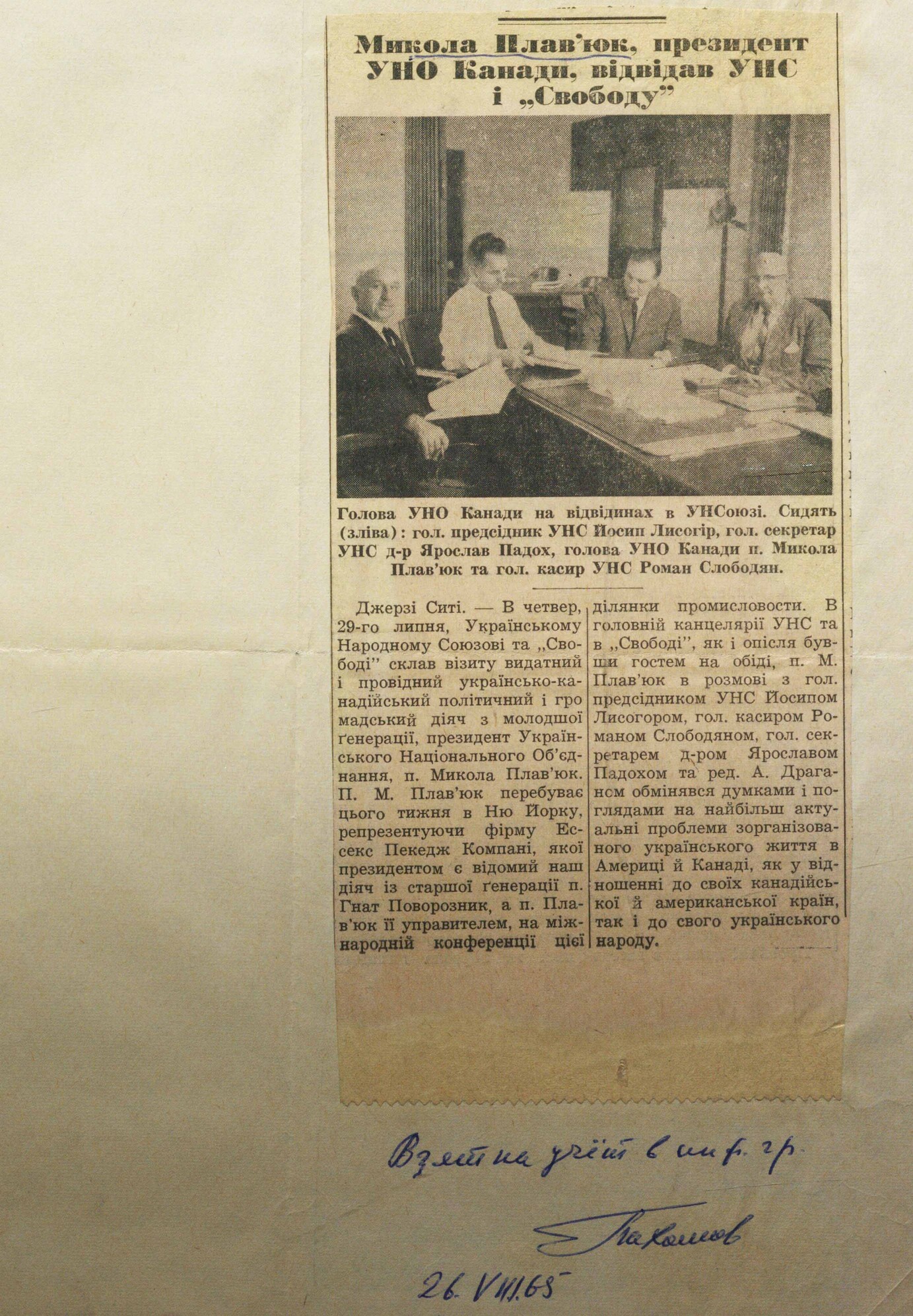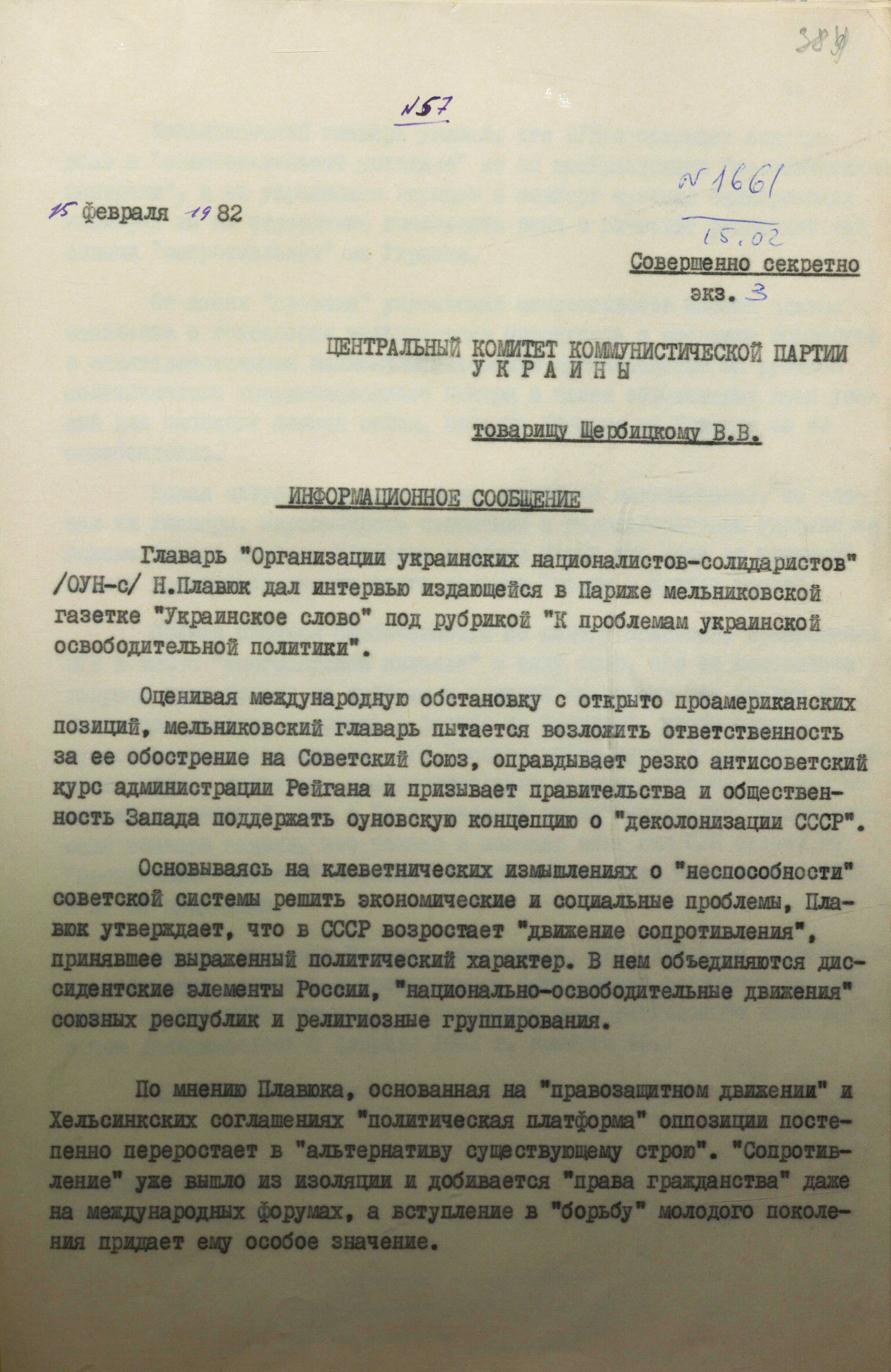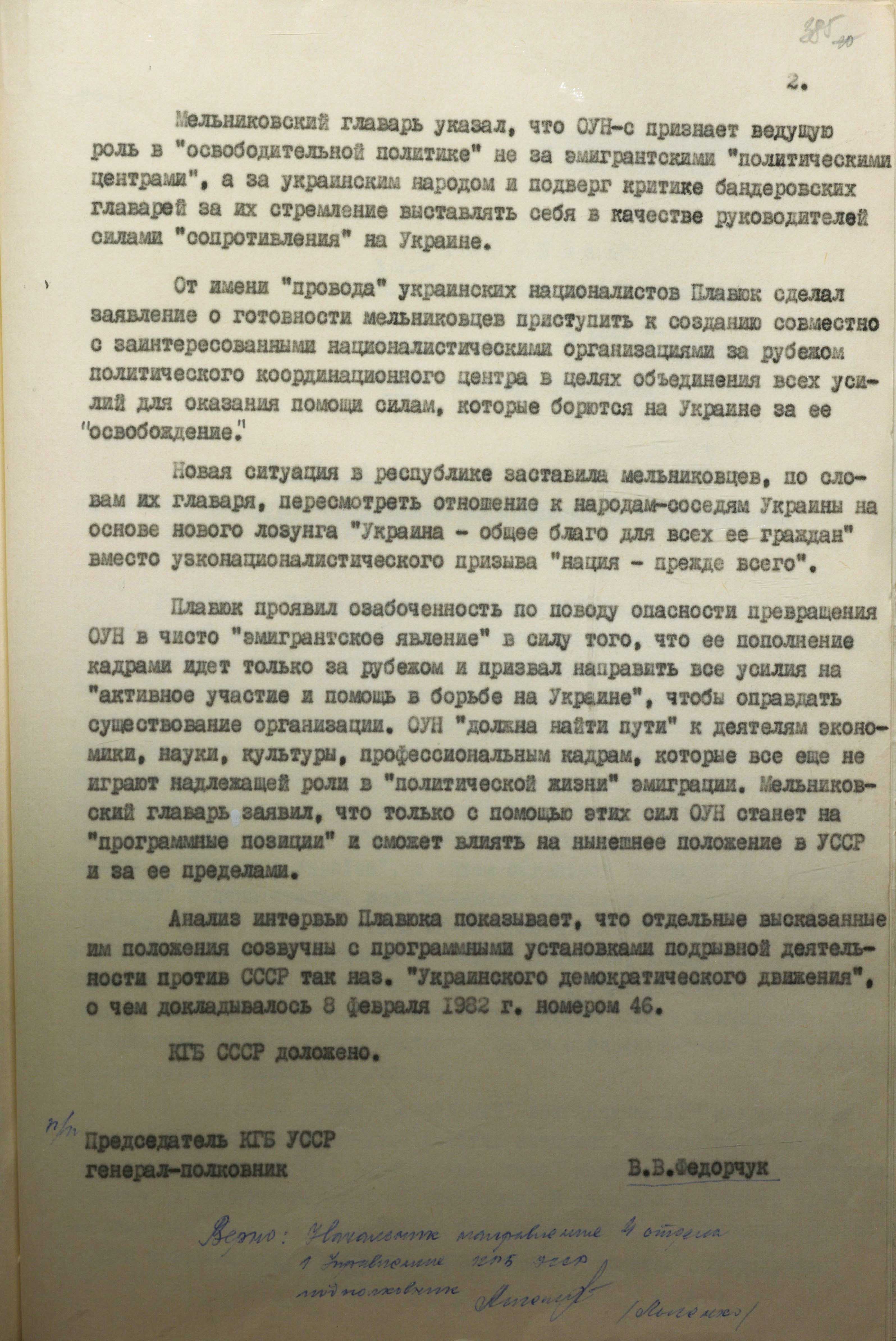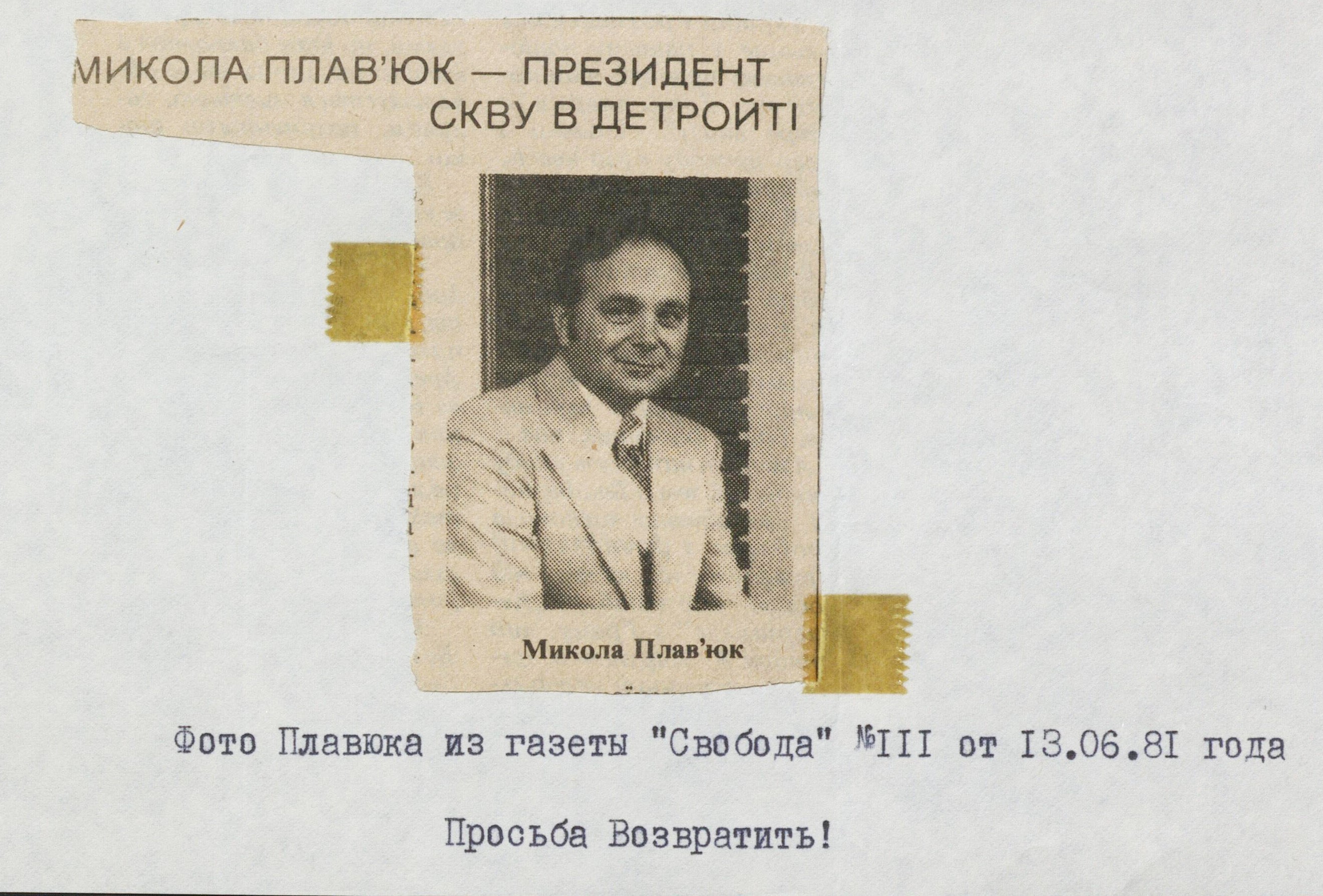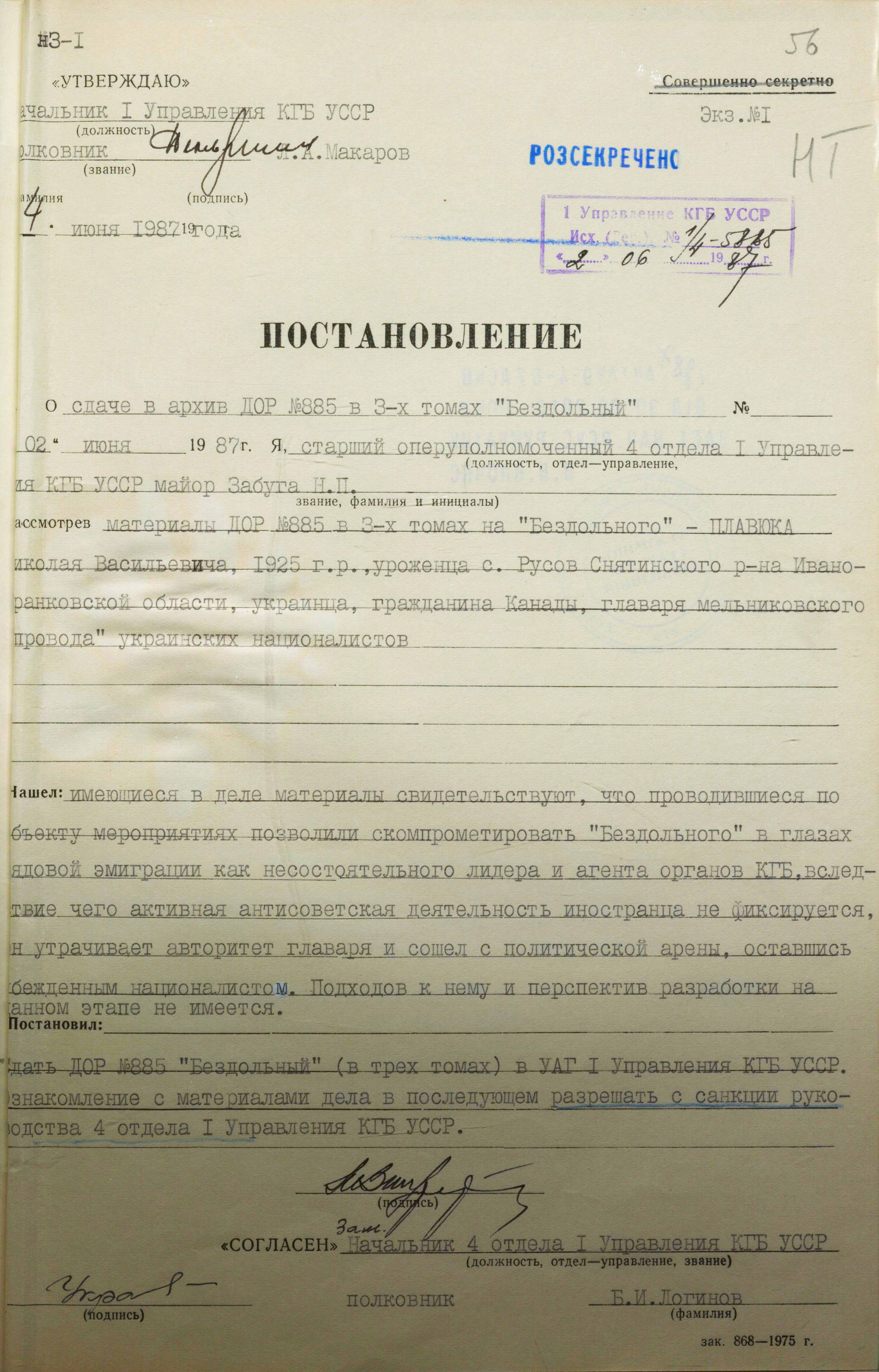Mykola Plaviuk. Subject to the kgb's Cultivation “Bezdolnyi” and His Fateful Contribution to the Establishment of Ukraine's Independence
8/22/2024
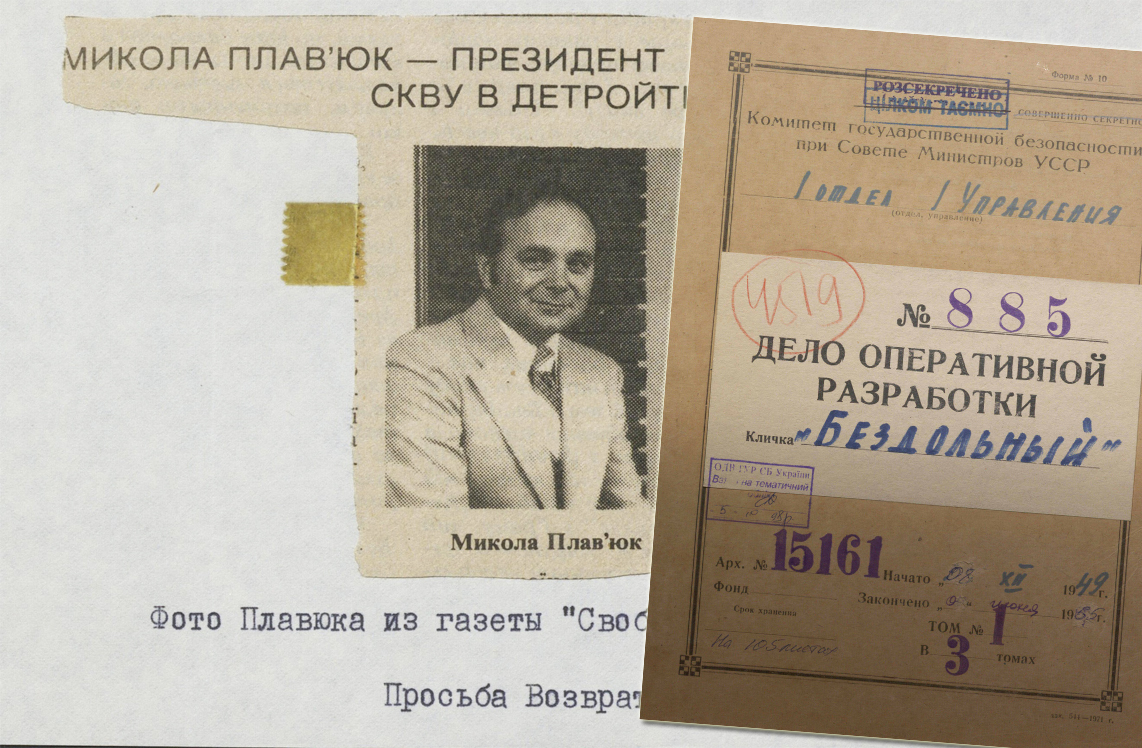
Mykola Plaviuk went down in history as the President of the World Congress of Free Ukrainians (1978-1981), the long-time leader of the OUN (1979-2012), and the last President of the Ukrainian People's Republic in exile (1989-1992). In August 1992, at the celebrations marking the first anniversary of the restoration of Ukraine's independence, it was he who handed over the Letter of Termination of the UPR State Center in Exile, the Presidential Seal, Hetman Ivan Mazepa’s Kleinods, and the Flag to the first popularly elected President of Ukraine, Leonid Kravchuk. By doing so, he confirmed the succession and continuity of Ukrainian statehood traditions. But the kgb obviously underestimated his role and place in the Ukrainian diaspora and the struggle for Ukraine's independence, and measures to cultivate and discredit him were essentially unsuccessful, as evidenced by declassified documents from the archives of the Foreign Intelligence Service of Ukraine.
“The Correct Surname Is Not Pavliuk, but Plaviuk”
At the end of December 1949, Lieutenant Pleshivtsev, lead investigator at the 2-n Department (Fighting the Ukrainian Underground) of the mgb of the Ukrainian ssr, made a decision to open a case against Mykola Pavliuk, the head of the organizational referentura of the regional Provid of the OUN-Melnikites, which was codenamed “Odynka.” The references, agent reports, and interrogation protocols accumulated in the case at that time, stated that this M. Pavliuk, approximately 25 years old, came from the village of Rusiv in Eastern Halychyna (now Sniatyn district of Ivano-Frankivsk region). During the Second World War, he was allegedly the leader of the OUN District Provid in Sniatyn, an active member of the “Yunatstvo” (“Youth”- Transl.) in Lviv, and in 1944 he left for Germany, where he lived and studied in Munich.
The MGB codenamed the operational cultivation case “Bezdolnyi” (“Unfortunate”- Transl). Thus, without having enough information about the person, his past and life at the time, and especially about the prospects for further development and growth, they made the verdict: ill-starred, unlucky, miserable.
Meanwhile, Mykola Vasyliovych Plaviuk (and it is he that all this story is about) was quite successfully building his life, social, political, and journalistic activities. Z. Horodyskyi’s article entitled “Social and Political Biography of Mykola Plaviuk” from the emigrant press, which was added to the case in 1984, states that in 1941, at the age of 16, he joined the Organization of Ukrainian Nationalists, led by Andriy Melnyk. In the ranks of the OUN youth, he underwent several training sessions and joined the activities of the Educational Union of Ukrainian Youth (VSUM, the name under which Plast operated in Western Ukraine at that time). In the ranks of the Educational Union of the Ukrainian Youth, he showed features of leadership and, despite his young age, became a member of the district and later the region leadership of the OUN. He did not break with Plast in all subsequent years and soon took up leadership positions in this Organization abroad.
“On behalf of the OUN leadership, Mykola Plaviuk moved to Vienna”, the article says, “where he conducted lively activities among Ukrainian workers, in particular from Eastern and Central lands of Ukraine, who were then being recruited into the ranks of the ROA (the Russian Army under the command of General Vlasov). Even in those days, a young man had to spread information among Ukrainian workers in difficult circumstances about why Ukrainians and russians should go different ways and why we should not join the ROA, despite the need to fight a common enemy, the communist occupier. It was with great joy that he observed the manifestations of the Ukrainian workers' deep understanding that our need is to gain a sovereign Ukrainian state, independent of either the German or russian occupiers” (BSA of the SZR of Ukraine. - F.1. - Case 15161. - Vol. 3. - P. 30).
In 1949, M. Plaviuk graduated from the Ludwig-Maximilian University of Munich with a degree in economics. At the end of 1949, he moved to Canada, where he soon became an active member of the Ukrainian diaspora. At the same time, the mgb had no reliable information about his move or other episodes of his life and work at the time. According to documents, he was still known as Pavliuk. This caused various problems with his identification, record checks, and collecting information on him. It was only in July 1952 that the mgb of the Ukrainian ssr found out the correct surname of the object of operational cultivation and issued a resolution to “consider the correct surname not Pavliuk, but Plaviuk”. However, the documents, which were usually in russian at the time, kept spelling the surname incorrectly – Plavyuk instead of Plaviuk.
Meanwhile, Plaviuk’s moving to Canada became a major problem for the mgb of the Ukrainian ssr. First attempts to learn at least something about his activities at the new location were unsuccessful. Therefore, in February 1953, a resolution was issued stating the following: “The 1st Department of the mgb of the Ukrainian ssr has no opportunities to cultivate Pavliuk-Plaviuk in Canada”. So the case was archived.
Six years later, in September 1959, the kgb under the council of ministers of the Ukrainian ssr received information that M. Plaviuk had become the head of the Ukrainian National Association (UNO) of Canada. It was found out that the Organization conducted cultural and educational activities, fought against manifestations of sovietism among Ukrainians abroad, and organized anti-soviet demonstrations. As a result, the case against its leader was taken back from the archives, re-registered, and the cultivation was resumed. The case now also included materials that had been collected over all those years by the kgb of the Ukrainian ssr in Stanislav region (since 1962 - Ivano-Frankivsk region). Those included information about close relatives who, under the control of the kgb, corresponded with M. Plaviuk and other relatives in Canada.
“Brotherly” Embrace... of the kgb
All the letters from Sniatyn to Canada and those from Canada to the Ukrainian ssr were taken under operational control by the kgb in the early 1950s. Their contents were carefully studied, and copies were attached to the case file. They were correspondences of a domestic nature, but they also allowed the kgb to collect the necessary information. In Sniatyn, there lived M. Plaviuk's father Vasyl, who worked as the head of the general department of the Sniatyn district executive committee. His brother Yaroslav was the first secretary of the district komsomol committee. Vasyl Plaviuk's mother and two sisters lived in Canada.
According to archival documents, Mykola did not write letters to his father or brother from abroad. He was afraid that correspondence could harm their studies and work. After all, he knew that for such contacts people in the ussr were hooked by the kgb, and this often had a negative impact on career growth. But even without this, his father and brother drew the kgb’s special attention. After all, they had close relatives abroad and periodically maintained contact with them. The men, as advanced and progressive representatives of the soviet and komsomol bodies, were interviewed and it was agreed that in the future all their communication with M. Plaviuk would be coordinated with the kgb. Chrkists hoped to resume correspondence with him and even developed a plan to do so with involvement of other relatives.
For the father, those kgb officers’ visits were somewhat burdensome. He was worried about his son and didn't want him to get into trouble because of all this. Operational notes drawn up as a result of the conversations, state that he was cautious about writing letters to his son. “We can feel his fear”, it was noted, “that his letters could cause unnecessary suspicion. He did not object to his son’s possible return to his homeland, but “he was against openly writing to his son such proposals or officially addressing him through the press”. But the kgb did not take this into consideration. The use of parents against children and children against parents for operational purposes, even if it could harm family relationships or lead to hostility in families, was often a common practice.
During such conversations, Yaroslav told the chekists that “if he managed to meet with his brother, he would be able to convince him of his false views on life, influence him from the best side and try to persuade him to return to his homeland”. That's what they decided to do.
Soon, Yaroslav was included in a tourist group of advanced soviet youth for a trip to Canada. The plan was to write a letter to his brother upon his arrival overseas and arrange a meeting. During the meeting, he was supposed to play on Mykola's patriotic feelings and love for Ukraine and suggest that he “help the homeland by periodically providing information about the activities and plans of emigrant nationalist organizations”. Depending on the reaction to this proposal, he had to explain that he was not speaking only as a relative, but was acting at the request of the soviet repatriation authorities. They said that if he agreed to return to the ussr, he would be assisted in finding a job and housing. M. Plaviuk's positive perception of such proposals was considered by the kgb as the first step towards persuading him to cooperate and further recruitment.
But those plans, tasks, and instructions remained only on paper. For various reasons, the chekists could not organize a tourist trip at that time. They soon returned to the issue. In 1958, a trip to Canada was planned for energy specialists on a trade union basis. Yaroslav was included in the group. To avoid any unnecessary suspicions, he was given a legend about being transferred from komsomol work to the Stanislav state farm's mechanical engineering and energy department.
After the arrival of a delegation of power engineers from the ussr in Canada, Yaroslav, as recommended by the kgb, sent a letter to his aunt asking her to facilitate a meeting with his brother. The meeting soon took place. According to archival documents, Mykola Plaviuk was rather wary of Yaroslav's arrival. He came to the meeting with a group of fellow party members. There was some suspicion on their part.
When they were alone in the hotel room, Mykola explained that he and his colleagues suspected that the kgb could be behind the visit. Yaroslav, of course, denied everything. However, having returned from abroad, he admitted that this forced him to change the plan of the conversation and give up the proposals to his brother that the chekists had asked him to make.
He asked about how his brother ended up abroad, about his studies, work, and family. In his turn, he told them about himself, his father, and his “wealthy and happy life in the Ukrainian ssr”. In response to his brother Mykola's incredulous remarks and objections, he offered to come and see for himself. “Plaviuk said”, reads the report, “that he would visit, but he was sure that he would see Ukraine only from behind bars”.
According to the documents, everyone defended own position in the discussion, which was taking on a political tone. In the end, Mykola Plaviuk offered to go to his home in the town of Hamilton, which is 70 kilometers from Toronto. So they did. There he introduced his brother to his children, they took pictures together, had lunch and came back. They did not meet again. They agreed that they would correspond more actively in the future.
The kgb of the Ukrainian ssr was not too happy with the results of the trip. According to the conclusions drawn, M. Plaviuk remained on clear nationalist positions and did not give up plans to fight for the restoration of an independent Ukraine. Therefore, in further operational cultivation, it was necessary to take other, more decisive measures.
“Discredit in the Eyes of Ordinary Members of the Organization”
At that time, the kgb under the soviet of ministers of the Ukrainian ssr received new information about M. Plaviuk, in particular, that he had become quite close to the head of the Ukrainian Nationalist Movement, Andrii Melnyk. From Canadian newspapers, chekists learnt about A. Melnyk's participation in the celebratory events on the occasion of the 25th anniversary of the UNO of Canada in 1957. In newspaper clippings received from the Ottawa residentura of the kgb, in many photos, M. Plaviuk was always next to the leader of the OUN: in some he sat with him in the presidium, in others he was handing him a portrait of the work of a local artist.
At the anniversary banquet, A. Melnyk voiced his opinion on the need to unite all Ukrainians in the free world, regardless of their country of residence and state affiliation, by creating the World Congress of Free Ukrainians (SKVU, current name – Ukrainian World Congress, UWC). This idea was picked up and developed by M. Plaviuk. As part of the preparatory commission for holding such a congress, he did a great organizational work. In addition, in 1964 he became a member of the Provid of Ukrainian Nationalists. And this prompted the kgb to implement new agent-operational measures against him.
One of the documents, dated February 1965, points out: “Bezdolnyi” – a member of the Central Provid of the OUN, the leader of the UNO in Canada – was studied in terms of recruitment, however, the available materials on “B” show that he is a convinced nationalist, a vicious enemy of the ussr. With regard to “Bezdolnyi”, conduct work on collecting materials on him and finding ways to discredit him abroad” (BSA of the SZR of Ukraine. - F. 1. - Case 15161. - V. 1. – P. 100).
A ground for discrediting was found in May 1967. At that time, according to archival documents, M. Plaviuk visited the USA as the Vice-President of the Committee of Ukrainians of Canada (KUK) and a member of the preparatory commission for holding the SKVU. In his speech in Philadelphia, he stated that “Ukrainian ssr activists, under orders from moscow, are taking measures to disintegrate, weaken and destroy Ukrainians abroad, emigration cannot live without Ukraine, separated from it. There must be connections! But it is necessary to separate the regime of occupation from the people...” (BSA of the SZR of Ukraine. - F. 1. - Case 15161. - Vol. 2. - P. 299).
During that meeting, a journalist from one of the newspapers spoke disparagingly about the long-standing enmity between the representatives of the OUN-B and OUN-M and asked whether it was possible to create the SKVU without prior agreement between them. To this, M. Plaviuk replied that not the Melnikites and not the Banderites, but all Ukrainians in the free world, united by a national idea, are responsible for the success of the SKVU.
“Using this circumstance”, the kgb note pointed out, “it is expedient on behalf of emigrants who do not share “Bezdolnyi”'s views, to try to discredit the positions of the Melnikites and Banderites on the issue of convening the SKVU and at the same time to voice the opinion that “Bezdolnyi” is conducting a provocative campaign activity abroad” (BSA of the SZR of Ukraine. - F.1. - Case 15161. - Vol. 2. - P. 303).
To fulfill this task, the kgb prepared a card depicting a caricature of M. Plaviuk on one side and President of the Ukrainian Congressional Committee of America Lev Dobrianskyi (as noted, “a representative of nationalist organizations with a pro-Bandera orientation”) on the other. The text contained a deliberate hint that M. Plaviuk was allegedly a secret employee of soviet special services acting on their instructions for the collapse of foreign Ukrainian organizations, despite the fact that this was not true. Such a postcard was sent from moscow to the residentura of the kgb in the USA with the aim of publishing it in local newspapers through operative sources. But the desired effect was not achieved, as evidenced by a number of articles attached to the case.
Thus, in the newspaper “Homin Ukrainy” published in New York there was an article entitled “The Agentura’s Attack on the SKVU”. It stated that the card, which was distributed anonymously, was aimed at provoking mutual suspicions and accusations among Ukrainians on the eve of the convening of the SKVU. Another newspaper, “Ukrainske Slovo”, published an article “SKVU and the Bolsheviks”. It stated that the appearance of such a card is considered as one of the ways to disrupt the holding of the SKVU and undermine the trust in its organizer. That is, representatives of the diaspora reasonably saw the hand of the kgb in this action.
But the Chekists ignored this and resorted to other operational measures to discredit M. Plaviuk in the eyes of ordinary members of the Organization. Thus, in one of the documents, it is noted that “the kgb department in Ivano-Frankivsk region proposed to the kgb of the Ukrainian ssr to discredit “Bezdolnyi” as an agent of state security by sending letters with cryptic writing to his address” (BSA of the SZR of Ukraine. - F.1. – Case 15161. – V. 2. – P. 329). That is, it was assumed that such a letter could be intercepted by Canadian counter-intelligence and this would become the basis for initiating some kind of proceedings against him and making this event public.
The action plan also provided for sending a letter to M. Plaviuk's address, which would contain suspicious phrases about the alleged renewal of conspiratorial contact with him by soviet special services. In the future, the content of such a letter was somehow planned to be brought to the attention of representatives of the OUN- B abroad, so that they, on their part, would launch a propaganda campaign with accusations against him.
“Simultaneously, we will take measures”, reads the document addressed to the chief of Service “A” (active measures) of the First Main Directorate of the kgb of the ussr, major general V. Ivanov, - “regarding the establishment of false contact with “Bezdolnyi” of the soviet representative, which, come the need, could be presented as confirmation of the version about his cooperation with our department”. The same document mentions that even earlier “for this purpose, misinformation was launched into the nationalist environment about “Bezdolnyi”’s alleged cooperation with the kgb” (BSA of the SZR of Ukraine. - F.1. - Case 15161. - Vol. 2. – P. 390–391).
That is, against M. Plaviuk, as well as against a number of other leaders of the Ukrainian national liberation movement, such a sharp operative measure was applied as an accusation of cooperation with the kgb, which was an obvious disinformation intended to elicit a corresponding reaction from both like-minded people and political opponents. But despite these and other negative attacks, nothing prevented the first World Congress of Free Ukrainians from being held in New York in 1967, into the preparation of which M. Plaviuk, together with other figures, put a lot of effort. In 1973, at the Second Congress, M. Plaviuk was elected its First Vice-President. In 1978, he became the President of the SKVU.
After that, the kgb tried to plan some new measures against him, but to no result. At first, they wanted to arrange a meeting in Europe through his brother Yaroslav. That correspondence was sometimes renewed, then suspended for a certain time, but did not produce any concrete results. Then they considered the possibility of his brother's trip to Canada and visiting M. Plaviuk there without warning. Eventually they concluded that all that was hopeless and that all the attempts “to establish contact with “Bezdolnyi” will not yield practical results, as he will refuse to meet and talk”.
Therefore, the kgb finally focused exclusively on measures to discredit him. In particular, they decided to prepare a brochure in which the life and activities of M. Plaviuk were to be portrayed in a negative light. In 1973, such a brochure entitled “Under Foreign Thresholds” was published under the auspices of the “Ukraina” society. According to archival documents, all materials for it were prepared in the offices of the kgb, and later edited, included in the publishing plan, and supervised in distribution abroad. Also, soon, in 1979, on the eve of the OUN Congress, where he was to be elected as the head of the Provid, the kgb prepared another card. It was about his alleged “incompetent activity in the PUN and his disorganization of the work of the SKVU”. That is, there was another attempt to discredit him.
“No Prospects for Operational Cultivation. Transfer the Case to the Archive”.
In June 1987, having weighed all available operational possibilities, the kgb of the Ukrainian ssr prepared a report in which it was noted that during the period of cultivation of “Bezdolnyi”(since 1949), measures were taken to both recruite and discredit him. Recruiting approaches did not yield results. At the same time, he proved himself to be a convinced nationalist. “Currently, Bezdolnyi is the head of the PUN of the Melnykites”, the paper read, “and he stands on strong nationalist positions. His speeches in the nationalist press confirm his commitment to the OUN platform... His views on the situation in the republic have not undergone significant changes. “Bezdolnyi”’s place of residence is unknown... There are no real approaches to him and prospects for further cultivation, and it is impossible to create them at this stage” (BSA of the SZR of Ukraine. - F.1. - Case 15161. - Vol. 3. - P. 55).
Such conclusions drawn by those who conducted the case made it possible to convince the leadership of the kgb of the Ukrainian ssr that the conduct of the case should be stopped and it should be transferred to the archive. Accordingly, the resolution reported that measures taken “made it possible to discredit “Bezdolnyi” in the eyes of ordinary emigrees as an incompetent leader and agent of the kgb, as a result of which the active anti-soviet work of the foreigner is not recorded, he loses the authority of the leader and has left the political arena…” (BSA of the SZR of Ukraine. – F. 1, Case 15161. – P. 56).
Instead, according to the interpretation of the kgb, “leaving the political arena” continued. But up and forward. According to open sources, in 1979, M. Plaviuk was elected as the head of the OUN, his organizational skills and long-term active and consistent position in the struggle for the Ukrainian cause having been highly estimated. In the period from 1979 to 2010, he was re-elected to this position 10 more times. In 1989, at the 10th session of the Ukrainian National Council held in Bound Brook (New Jersey, USA), he was elected the Vice-President of the Ukrainian People's Republic in exile, and later, after the death of Mykola Livytskyi, the President of the Ukrainian People's Republic in exile (1989 -1992).
After the declaration of independence of Ukraine on August 24, 1991, Mykola Plaviuk took an active part in the development of its statehood. In January 1992, he set foot on Ukrainian soil for the first time after a 48-year break, no longer fearing, as before, that he would have to look at life in Ukraine only through bars. He became the founder and head of the Oleh Olzhych Foundation, the President of the Olena Teliha Publishing House, he published the weekly “Ukrainian Word”, and put a lot of effort into creating the Museum of the Ukrainian Revolution of 1917–1921 in Kyiv. In May 1993, he was granted Ukrainian citizenship. For services to the Motherland, he was awarded the Order of Prince Yaroslav the Wise, I and II classes, and the Order of Merit, III class.
He passed away on March 10, 2012, and was buried in the city of Oakville (Ontario, Canada) at the Ukrainian cemetery of St. Volodymyr.
The above mentioned article about M. Plaviuk from the émigré newspaper, which was included in the case, said about his life creed as follows: “At the center of his life philosophy and political action was always Ukraine – the Ukrainian people, their real needs and opportunities in the struggle for state identity. Deep faith in the ability of our people to oppose the attempts of russian-soviet imperialism to destroy its spiritual individuality was the source of its strength and was based not only on the historical experience of the past, when our people overcame more than one calamity, but also on the awareness of the trends of the historical era, which brings an end to all empires, including the russian one” (BSA of the SZR of Ukraine. - F.1. – Case 15161. - Vol. 3. – P. 33).
